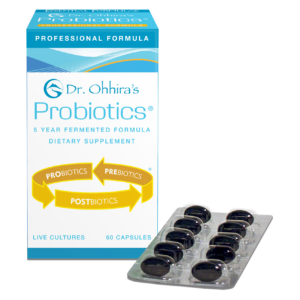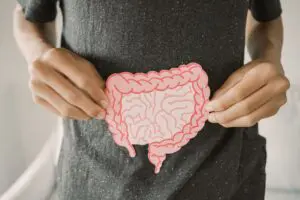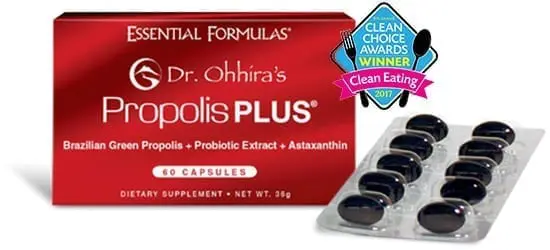How Postbiotic Metabolites Influence Mood, Behavior & Mental Health
By Ross Pelton, RPh, PhD, CCN
Scientific Director, Essential Formulas
A colleague recently asked me if any studies have been conducted on Dr. Ohhira’s Probiotics regarding the neurotransmitter serotonin.
The short answer is NO. However, this question allows me to discuss how some important postbiotic metabolites influence moods, emotions, and mental health. The effects I will discuss are related to the emerging topic called the microbiome-gut-brain axis, which involves how probiotic bacteria and some of the postbiotic metabolites they produce communicate with the brain.
One of the first studies that discovered the impact that gut bacteria have on the brain and regulation of emotion and behavior was conducted in 2013 by Dr. Stephen Collins at McMaster University in Canada. Dr. Collins is a gastroenterologist and a leading microbiome researcher.
Dr. Collins and his group selected two strains of mice that were bred to express specific behavioral characteristics. The BALB/c strain of mice has been produced to have very timid and anxious behavior, while the NIH Swiss strain of mice has been bred to be very courageous, bold, and exploratory. The researchers then conducted a fecal microbial transplant (FMT), which involved extracting bacteria (and postbiotic metabolites) from each strain of mice’s intestinal tract and transplanting them into the opposite strain.
Unexpectedly, this swap resulted in a total reversal of their behaviors. The strain that usually exhibited highly timid and anxiety-prone behavior became much more fearless and bold explorers of their environment. In contrast, the formerly courageous mice suddenly became more anxious, fearful, and shy. The researchers said the change in behaviors was so swift and complete that the result was “uncanny.”i
Although this study was conducted with mice, it showed that some essential behavioral characteristics are NOT driven solely by the animals themselves but are also strongly influenced and directed by the animal’s gut bacteria and the postbiotic metabolites produced in the gut microbiome.
Three essential amino acids, tryptophan, tyrosine, and phenylalanine, are made by various probiotic bacteria strains in the gut microbiome. Tryptophan is the immediate precursor for the neurotransmitter serotonin. It has been reported that approximately 95% of the body’s serotonin supply is manufactured by various strains of probiotic bacteria in the gut microbiome. This regulates serotonin levels in both the colon and the circulating blood.ii,iii
In addition to serotonin, various gut bacteria species can produce the neurotransmitters dopamine, norepinephrine, epinephrine, GABA, and acetylcholine.iv
Psychiatry is beginning to embrace the understanding that gut bacteria and the postbiotic metabolites they produce profoundly influence moods, emotions, and mental health.v Although the role the microbiome plays in gut-brain communication is a relatively new area of study, it is ushering a revolution in the understanding of the link between the gut microbiome and mental illness. In the future, practitioners who specialize in the field of “psychobiotics” may be able to recommend specific probiotic formulations to help people improve moods and emotions and/or treat more severe conditions such as bipolar disorder and schizophrenia.vi
-
 Dr. Ohhira’s® Probiotic Supplements$13.95 – $89.95
Dr. Ohhira’s® Probiotic Supplements$13.95 – $89.95 -
 Reg´Activ® Essential ME-3$39.95
Reg´Activ® Essential ME-3$39.95 -
 Dr. Ohhira’s® Probiotics Professional Formula$39.95 – $129.65
Dr. Ohhira’s® Probiotics Professional Formula$39.95 – $129.65






